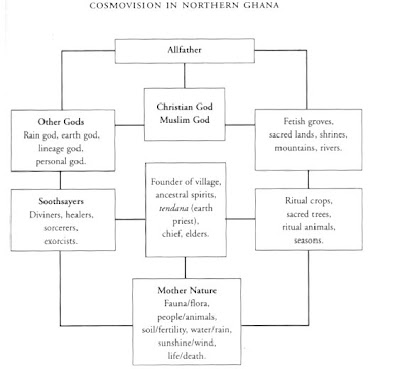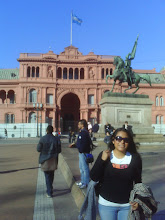 Durante el último parcial, nos topamos con un trabajo de Frantz Fanon llamado Los condenados de la Tierra, Les damnés de la terre en su título original (1961).
Durante el último parcial, nos topamos con un trabajo de Frantz Fanon llamado Los condenados de la Tierra, Les damnés de la terre en su título original (1961).En primer lugar, el libro cuenta con prefacio de Jean-Paul Sartre que nos da una perspectiva diferente ya que plantea el momento, en que escribe, como el fin de la dialéctica por lo que podemos señalarlo como un punto en donde una nueva historia puede empezar a escribirse. Ésta nueva historia, por supuesto, partiría de África. El prefacio de Sartre nos hace referencia a la medidad en que el continente ha sufrido de la descolonización y como a partir de ella, ha mezclado sus tradiciones tribales con las adquiridas durante la colonia para dar como resultado la democracia bajo la que los países africanos se rigen en la actualidad.
Podemos resaltar la posición de la élites como un grupo que por influencia modifica las condiciones del escenario y las regiones es decir, un grupo que modifica las tradicones originales de la región.
I. La Violencia
Desde las primeras líneas de éste capítulo logre entender que éste sería un libro
 adelantado a su época y que podemos utilizar para hacer una comparación con los acontecimientos que actualmente están sucediendo en África. Como lo sabemos, éste tipo de sucesos se han tornado violentos en los últimos años. Basta recordar el genocidio de Rwanda en 1994 o la situación humanitaria en la República Democrática del Congo.
adelantado a su época y que podemos utilizar para hacer una comparación con los acontecimientos que actualmente están sucediendo en África. Como lo sabemos, éste tipo de sucesos se han tornado violentos en los últimos años. Basta recordar el genocidio de Rwanda en 1994 o la situación humanitaria en la República Democrática del Congo.Pues es así, violenta, como se plantea la liberación nacional que debe tener el continente. Si bien se señala que la descolonizaciónpropone cambiar el orden del mundo, nos la muestra como un programa de desorden sin importar de la manera en qué se dé. Es por eso que desde dicho punto me he encontrado en contra del autor, ya que no nos puede exponer que las soluciones del llamado Tercer Mundo se deben basar en una revolución, sin importar qué tipo de revolución, violenta.
II. Grandeza y debilidades del espontaneísmo
Continuamos resaltando la importancia de las élites en la liberación de los pueblos áfricanos. El autor separa claramente la burgesía del proletariado y menciona a éste último como "el núcleo del pueblo". Además, señala a las masas campesionas de los países industrializados como los elementos menos conscientes y menos organizados, por lo que podemos observar como una clara muestra de la falta de pensamientos innovadores que quiere plasmar.
Resulta drástico mencionar como "vendidos" a los habitantes de los pueblos que tratan de llevar una vida fuera del marco del sistema estableciod al terminar la colonia. Éste fenómeno que hemos estudiado como DIASPORA, es señalado por el autor como "traición". Los movientos rurales se nos siguen describiendo como violentos ya que incluso se nos menciona una dictadura necesarios en los países subdesarrollados.
Me comienza a paracer grave que éste tipo de textos lleguen a manos de personas hambrientas de poder y que sólo buscan envolver a las masas con promesas revolucionarias que, al final, nos llevan a desastres nacionales como muchos de los que se viven actualmente en África. Lugares en donde se debe poner más atención a las agendas sociales que a las luchas sangrientas.

Dos nuevos factores se unen a la lucha nacional y estos son los partidos políticos y el ejercicio militar. Además en esta ocasión la conciencia nacional juega un papel importante ya que se involucra directamente con la movilización popular. La búsqueda de una verdadera indentidad dejando a un lado todo lo que la colonia les llevó. Al seguir hablando de un combate anticolonialista, nos expone tener la vía revolucionaria, como la única salida luego de la independencia de lo contrario, el autro pronostica un estancamiento.
Algo muy importate que he considerado a partir de éste punto del texto es que, en gran medidad, el autor nos muestra una frente que se opone al Estado y que lo describe como un órgano de poder incapaz de comprender a la clase obrera. Gran parte de lo dicho nos hace renegra del capitalismo que vivimos, nos hace aceptar el poder mal distribuido y la falta de democacia en los pueblos de "Tercer Mundo". Además se recomienda ignorara la fase burgesa después de la descolonización cuando sabemos, y la historia lo ha demostrado, que las naciones que acaban de salir de la colonia no puede comenzar su nueva etapa sin bases... y éstas bases deben de ser tomadas, sin duda, del colonizador.
 Me he encontrado con un capítulo que pone en pie la lucha de dos ideologías que cambiarán a África: ¿Revolución o innovación? Sin duda me inclino por el segundo término, no sólo porque ha sido el hemos estado defendiendo durante todo éste tiempo, sino porque hemos comprobado como la innovación es la respuesta al resurgimiento y por lo tanto al futuro no sólo de África sino de todos los países en vía en desarrollo.
Me he encontrado con un capítulo que pone en pie la lucha de dos ideologías que cambiarán a África: ¿Revolución o innovación? Sin duda me inclino por el segundo término, no sólo porque ha sido el hemos estado defendiendo durante todo éste tiempo, sino porque hemos comprobado como la innovación es la respuesta al resurgimiento y por lo tanto al futuro no sólo de África sino de todos los países en vía en desarrollo. Considero importante como el tema de la cultura es abordado hacia el final del libro, cuando fácilmente podemos ligar la cultura con la educación la cuál debe ser las base de la restuccturación de un país, pueblo, nación o tribu luego de la descolonización. Sin educación, nos seguiremos saltando fases como la propuesta en el capítulo anterior. Fases en donde se debe de establecer el futuro del país con bases económicas, políticas y sociales. Fases con las que lograremos terminar con los líderes "ignorantes" que, al final, se inclinarán por su lado egoísta.
Considero importante como el tema de la cultura es abordado hacia el final del libro, cuando fácilmente podemos ligar la cultura con la educación la cuál debe ser las base de la restuccturación de un país, pueblo, nación o tribu luego de la descolonización. Sin educación, nos seguiremos saltando fases como la propuesta en el capítulo anterior. Fases en donde se debe de establecer el futuro del país con bases económicas, políticas y sociales. Fases con las que lograremos terminar con los líderes "ignorantes" que, al final, se inclinarán por su lado egoísta.  capie en dejar a un lado las influencia de Europa y construir un continente que vaya más allá de la misma nación que los colonizo.
capie en dejar a un lado las influencia de Europa y construir un continente que vaya más allá de la misma nación que los colonizo. 



